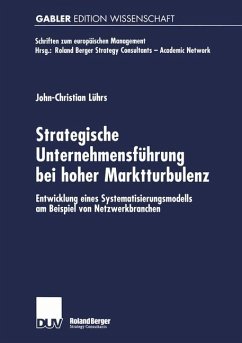
Trust within Organizations of the New Economy
A Cross-Industrial Study

PAYBACK Punkte
0 °P sammeln!
The role of trust in governing institutions has been disputed for years. Increasing uncertainty and people?s personal concerns about future perspectives seem to have created an increasing need for what we call trust. Simultaneously, the same uncertainty that induces this increased demand for trust seems to be undermining it.Marco Tulio Zanini examines the effects of different industry-specific institutional framework constraints on the level of trust within business organizations, particularly the possible differences in old and new economy. Based on the results of a survey carried out in seve...
The role of trust in governing institutions has been disputed for years. Increasing uncertainty and people?s personal concerns about future perspectives seem to have created an increasing need for what we call trust. Simultaneously, the same uncertainty that induces this increased demand for trust seems to be undermining it.
Marco Tulio Zanini examines the effects of different industry-specific institutional framework constraints on the level of trust within business organizations, particularly the possible differences in old and new economy. Based on the results of a survey carried out in seven major companies from different sectors of the Brazilian economy, the author shows that trust is more likely to be found in relatively stable, hierarchical and bureaucratic organizations whereas there is comparatively little trust in new economy firms.
Marco Tulio Zanini examines the effects of different industry-specific institutional framework constraints on the level of trust within business organizations, particularly the possible differences in old and new economy. Based on the results of a survey carried out in seven major companies from different sectors of the Brazilian economy, the author shows that trust is more likely to be found in relatively stable, hierarchical and bureaucratic organizations whereas there is comparatively little trust in new economy firms.














